On May 27, 2017, Carlos Choc took a photo. It was the body of the fisherman Carlos Maaz lying on the asphalt in the middle of a protest against the Fénix mine in the municipality of El Estor, in northeastern Guatemala.
Maaz was part of a group of local fishermen who that day were speaking out against the operation of the nickel mine, owned by Solway Investment Group, a Russian-owned Swiss-based company operating in the Latin American country as the Guatemalan Nickel Company (CGN).
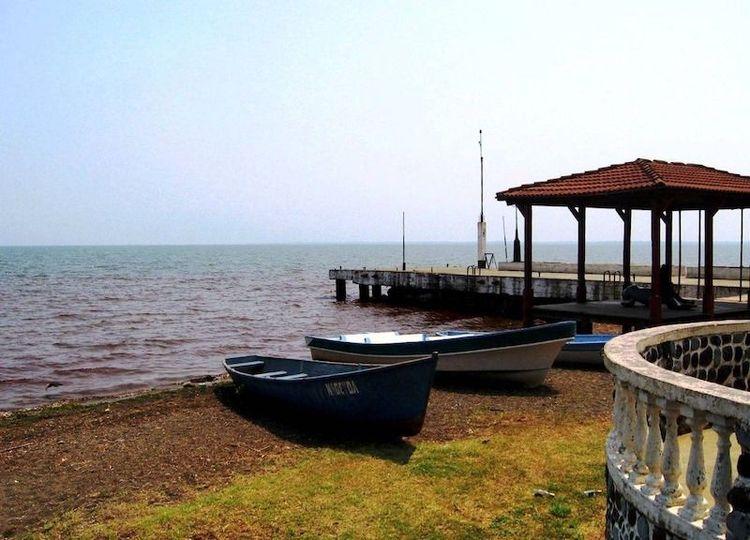
A red spot stains the waters of Lake Izabal. Photo: Carlos Choc.
A red spot appeared in Lake Izabal, near the Atlantic, an ecosystem where fishing is one of the main productive activities for the Q'eqchi' Maya population.
The photograph of Choc not only gave an account of the State's repression against fishermen, but it also contradicted the official version that there were no victims in the protests.
The consequences of living in a country where freedom of expression is threatened continue today, more than six years later, Choc is linked to prosecution for the alleged crime of illegal detention on that day of protest in 2017, for a CGN accusation.
Choc's judicial process has been plagued by arbitrary decisions from the start. The Guatemalan State and the mine maintain links at various levels, as demonstrated in a series of leaks carried out by the hacktivist group Guacamaya called Mining Secrets and in the research work of various Guatemalan and international media.
An extension strategy
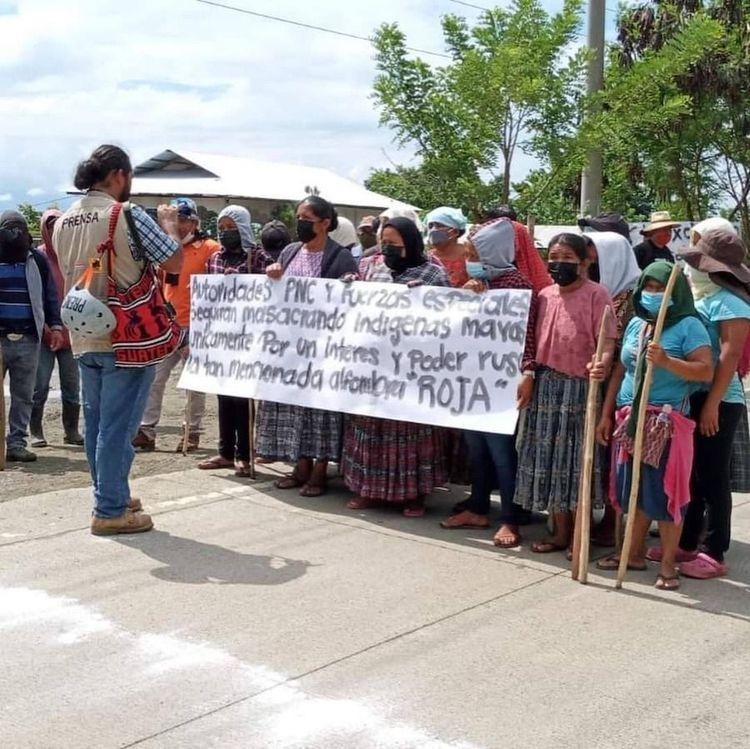
Choc has dedicated himself to covering social movements. Photo: Courtesy.
In the case of Choc, in February 2018, his hearing was suspended by Judge Edgar Aníbal Arteaga López, of the Izabal Criminal Court of First Instance, Narcoactivity and Crimes against the Environment, due to the strong presence of the press and staff of the United Nations High Commissioner for Human Rights.
Choc would have to wait until January 2019 for the court to take its first statement. In other words, he waited a year eight months after the fishermen's demonstration to be heard. Then it was linked to the process. And in November of that year, his case was provisionally closed.
What does it mean to be temporarily closed and not permanently? , the journalist is asked.
“It's like you have one foot in jail, you have one foot outside, because provisionally at any time, at any time, they report the same mine to you again. I mean, you're left vulnerable. Not completely with all the rights guaranteed to you by the Constitution... here at any time you can reinvent other things, false complaints and get you thrown into jail once and for all, because you are already in a case where your case was provisionally closed. So they didn't accept my lawyers,” Choc explained.
The community journalist's lawyers argued that the case should be permanently closed as requested by the Public Ministry itself and that the judge had given an opinion by choosing to close it provisionally.
After a tour of the highest authorities in Guatemala, the journalist's defense arguments were ignored and Choc was linked to the trial. A hearing held in November 2019 was suspended again, as part of what he calls a strategy of “elongation” and “criminalization”.
Next hearing
Now Choc is waiting for a next hearing that will take place on August 22.
Choc hopes that his case will be finally closed and “I will really end all this criminal prosecution and work freely because I cannot carry out my work with all freedom knowing that we have alternative measures”.
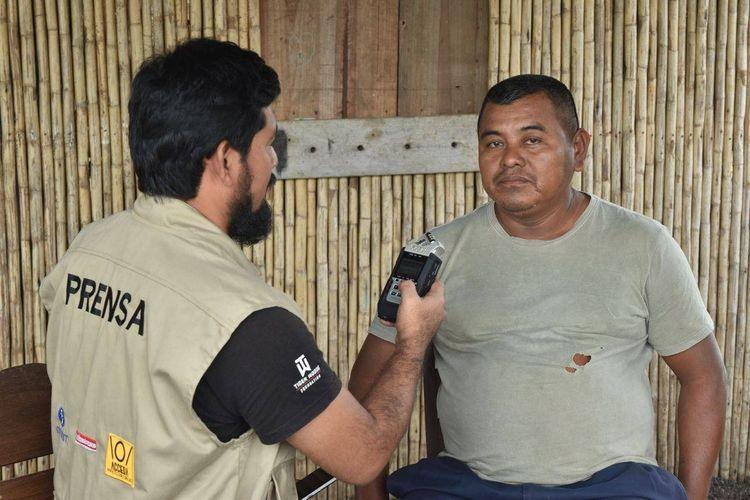
Choc with the tape recorder in his hand conducts an interview. Photo: Courtesy.
In Guatemala, the alternative measure allows a person to continue with the process of their case without being pressured.
However, this condition, according to the journalist, prevents him from carrying out his work freely by limiting it to covering hearings, questioning judicial and police decisions, as well as issues of corruption and co-optation.
This is not the only case that was opened against Choc, on September 13, he was acquitted of another judicial proceeding initiated in 2019 in which he was singled out for the alleged crime of instigating a crime since he was beaten by elements of the police of that country on October 22, 2021.
After the police crackdown, 13 officers reported 11 indigenous people, fishermen and Choc himself for instigating crimes.
Almost three years after the events, Judge Arteaga determined that there were not enough elements to sentence the journalist and acquitted him of this second criminal proceeding.
Mining Secrets
Millions of uncovered internal documents revealed that the conglomerate sought to manipulate communities during inquiries about the mine's permanence, which led to the mine's reopening in December 2021.
At least 470 mailboxes and 8 million documents contain intrigues and payments to leaders and authorities, as well as plans to remove communities from the area, according to information from Forbidden Stories, an international network of journalists, who obtained these documents and shared them with allied media.
The fishermen's protests that Choc covered did have an effect, the suspension of the mine operation by the Supreme Court of Justice of Guatemala starting in 2021.
The decision required consultations with indigenous leaders to resume. But the process was tainted by a wave of donations, which resulted in the purchase of wills, according to various journalistic investigations.
For example, the payment of 34,000 dollars for the purchase of 10 fishing equipment to keep the Bocas del Polochic Fishermen's Association as allies, according to the CGN-Pronico document, reported El País, one of the media that had access to the documents.
The mining company also deployed strategies to reaccommodate people from the Las Nubes community who did not want to leave their homes, by firing workers and contaminating crops with chemicals and spreading rumors of AIDS in the town.
In response to these leaks, Solway has denied that payments to community members “correspond to reality”. However, journalists have confirmed cases such as that of Guadalupe Xol Quinich, a member of the indigenous council of El Estor, who refused to sign an agreement to endorse the consultation carried out by the mine with indigenous peoples. For his firm, they offered him 3,000 quetzales, he confirmed to the Spanish media.
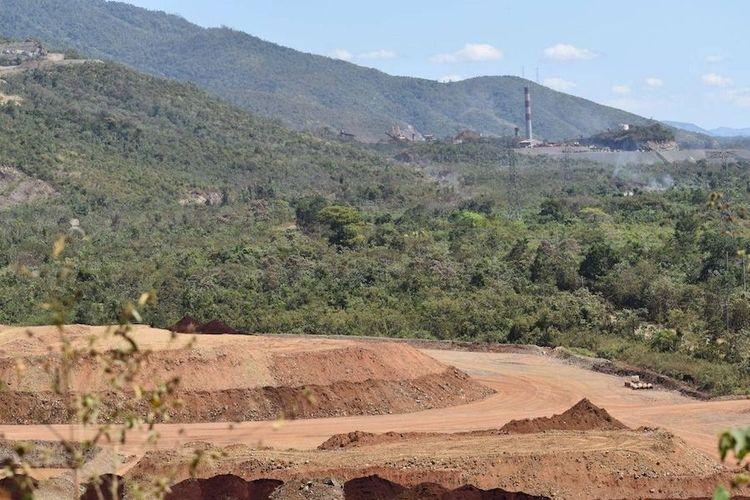
Mining in El Estor, Izabal. Photo: Carlos Choc
The mine is currently keeping its activities suspended.
“Right now it's suspended but not because of the State of Guatemala... but because it received a sanction from the United States in December of last year, where Solway has many strong ties with a Russian company and that's where geopolitics comes in,” Choc explained.
In November, the Office of Foreign Assets Control (OFAC) of the Treasury Department sanctioned Russian Dmitry Kudryakov, for allegedly being in charge of Solway's operations in Guatemala and the Belarusian Iryna Litviniuk.
OFAC accuses them of having “directed multiple bribery schemes over several years involving politicians, judges and government officials.”
“We support the people of Guatemala and we support the protection of their country's natural resources against external exploitation,” said the Undersecretary of the Treasury for Terrorism and Financial Intelligence, Brian E. Nelson in the same statement.
On the basis of these allegations, Solway announced that it was suspending both executives from their positions.
Later on May 22, he sent a new statement stating that an independent study determined that there was no evidence of Russian ownership or control over Solway. The company said that after the invasion suffered by Ukraine, it sold its assets in Russia.
Climate of persecution
The case of Choc is one of the most representative in a climate of hostility experienced by the press in Guatemala during the administration of President Alejandro Giammattei.
Recently, José Rubén Zamora, an award-winning journalist, was sentenced to six years in prison for the alleged crime of money laundering on June 14; a crime he accuses of being fabricated by the current regime.
Eight reporters from this media outlet and others, such as the Community Press, have been accused by the Public Prosecutor's Office for the alleged crime of “obstruction of justice”, whose current incumbent Consuelo Porras was renewed for a four-year term by Giammattei in 2022.
For Choc, the corporate press did not see the repression that was coming with the current government, something that they were already suffering in the alternative media.
What is agreed is that the various sectors have made contributions to denounce corruption in the government and that repression has intensified in general terms.
“This president is indeed an enemy of the alternative press, an enemy of independent journalists,” he says.
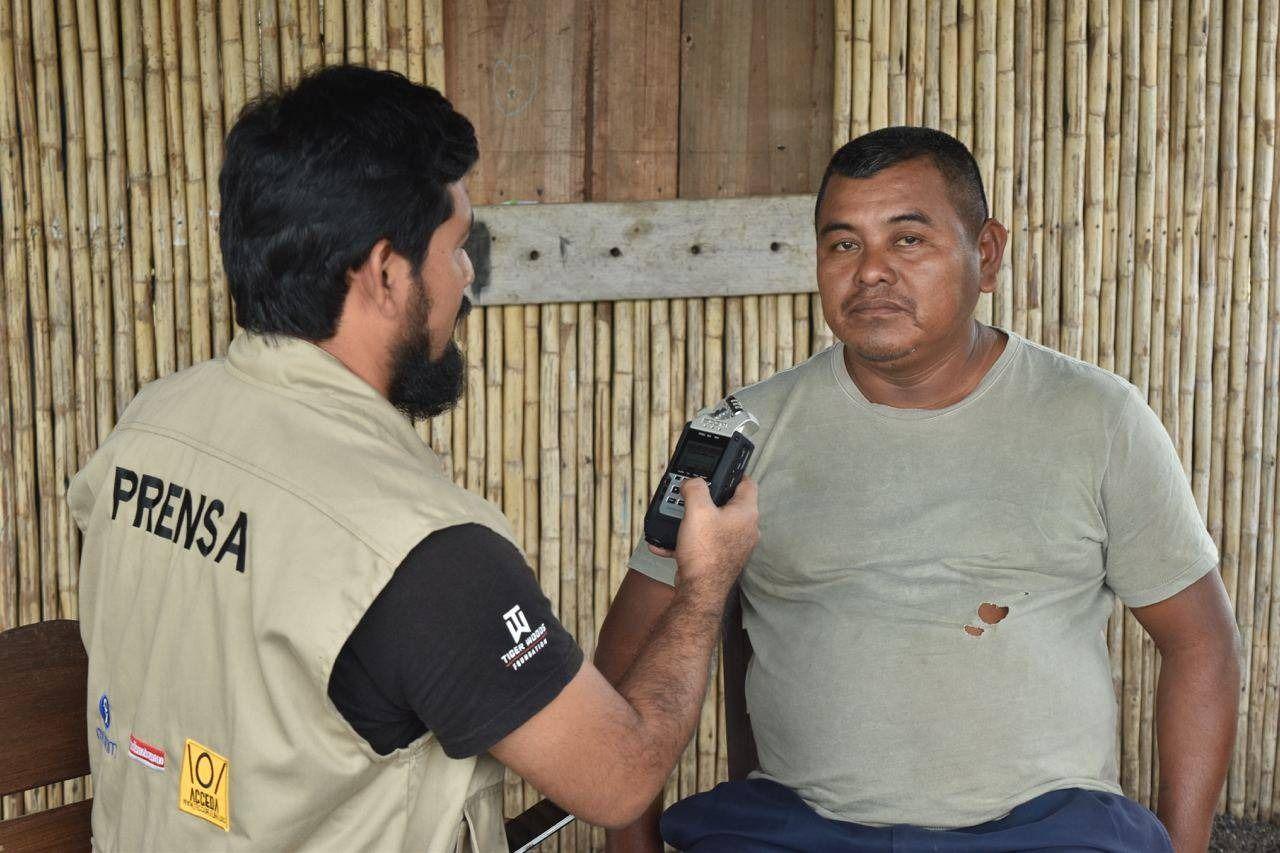


Comentarios (0)